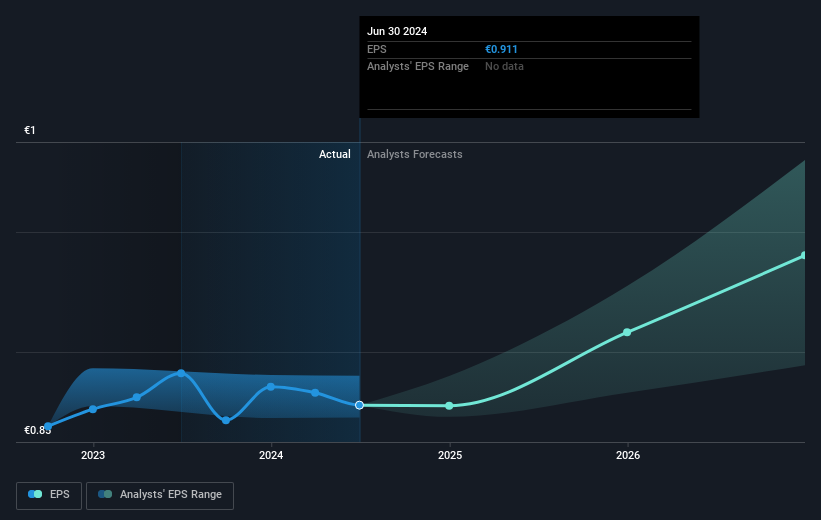- Italy
- /
- Auto Components
- /
- BIT:BRE
The one-year shareholder returns and company earnings persist lower as Brembo (BIT:BRE) stock falls a further 3.4% in past week

Passive investing in an index fund is a good way to ensure your own returns roughly match the overall market. Active investors aim to buy stocks that vastly outperform the market - but in the process, they risk under-performance. Investors in Brembo N.V. (BIT:BRE) have tasted that bitter downside in the last year, as the share price dropped 18%. That's disappointing when you consider the market returned 18%. However, the longer term returns haven't been so bad, with the stock down 13% in the last three years.
Since Brembo has shed €114m from its value in the past 7 days, let's see if the longer term decline has been driven by the business' economics.
View our latest analysis for Brembo
While the efficient markets hypothesis continues to be taught by some, it has been proven that markets are over-reactive dynamic systems, and investors are not always rational. One way to examine how market sentiment has changed over time is to look at the interaction between a company's share price and its earnings per share (EPS).
Unfortunately Brembo reported an EPS drop of 5.5% for the last year. This reduction in EPS is not as bad as the 18% share price fall. So it seems the market was too confident about the business, a year ago. The P/E ratio of 11.12 also points to the negative market sentiment.
The image below shows how EPS has tracked over time (if you click on the image you can see greater detail).

Before buying or selling a stock, we always recommend a close examination of historic growth trends, available here.
What About Dividends?
It is important to consider the total shareholder return, as well as the share price return, for any given stock. The TSR incorporates the value of any spin-offs or discounted capital raisings, along with any dividends, based on the assumption that the dividends are reinvested. Arguably, the TSR gives a more comprehensive picture of the return generated by a stock. We note that for Brembo the TSR over the last 1 year was -16%, which is better than the share price return mentioned above. And there's no prize for guessing that the dividend payments largely explain the divergence!
A Different Perspective
Brembo shareholders are down 16% for the year (even including dividends), but the market itself is up 18%. However, keep in mind that even the best stocks will sometimes underperform the market over a twelve month period. On the bright side, long term shareholders have made money, with a gain of 3% per year over half a decade. If the fundamental data continues to indicate long term sustainable growth, the current sell-off could be an opportunity worth considering. I find it very interesting to look at share price over the long term as a proxy for business performance. But to truly gain insight, we need to consider other information, too. To that end, you should be aware of the 1 warning sign we've spotted with Brembo .
We will like Brembo better if we see some big insider buys. While we wait, check out this free list of undervalued stocks (mostly small caps) with considerable, recent, insider buying.
Please note, the market returns quoted in this article reflect the market weighted average returns of stocks that currently trade on Italian exchanges.
Valuation is complex, but we're here to simplify it.
Discover if Brembo might be undervalued or overvalued with our detailed analysis, featuring fair value estimates, potential risks, dividends, insider trades, and its financial condition.
Access Free AnalysisHave feedback on this article? Concerned about the content? Get in touch with us directly. Alternatively, email editorial-team (at) simplywallst.com.
This article by Simply Wall St is general in nature. We provide commentary based on historical data and analyst forecasts only using an unbiased methodology and our articles are not intended to be financial advice. It does not constitute a recommendation to buy or sell any stock, and does not take account of your objectives, or your financial situation. We aim to bring you long-term focused analysis driven by fundamental data. Note that our analysis may not factor in the latest price-sensitive company announcements or qualitative material. Simply Wall St has no position in any stocks mentioned.
About BIT:BRE
Brembo
Designs, develops, produces, and sells braking systems and components for cars, motorbikes, and industrial vehicles and machinery.
Excellent balance sheet and good value.
Similar Companies
Market Insights
Community Narratives




